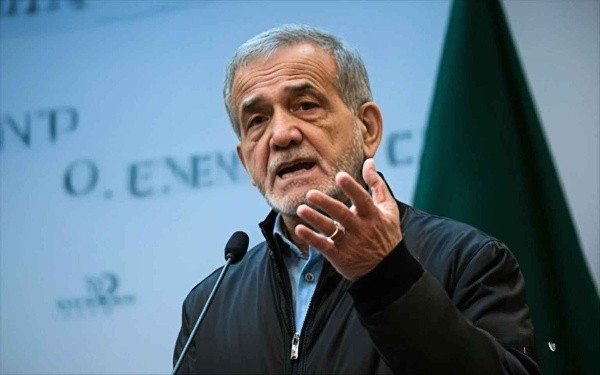Iran’s Plan to Strike Back Against the U.S.
Iran’s Military Preparations Following U.S. Attacks
Loading...

Iran’s foreign minister vows his country ‘will NOT remain indifferent’ as Israel, under constant rocket fire, launches heavy strikes on Hezbollah sites across Lebanon
Iranian President Warns of Israeli "Traps"
Iranian President Masoud Pezeshkian has accused Israel of attempting to provoke a broader conflict in the Middle East, describing recent military actions as "traps" designed to draw Iran into war. Speaking to media representatives, Pezeshkian expressed concerns over the escalating violence between Israel and Hezbollah, a Lebanese militant group backed by Iran. He emphasized that Iran does not wish to see the current hostilities expand beyond the Gaza Strip and the Israeli-Lebanon border.
Pezeshkian highlighted incidents such as the explosions of electronic devices in Lebanon, which he attributed to Israeli actions, and the assassination of Hamas political leader Ismail Haniyeh in Tehran. "They are dragging us to a point where we do not wish to go," he stated, underscoring the futility of warfare and the absence of true victors in such conflicts.
Escalating Violence on the Israeli-Lebanon Border
Since October 8, 2023, Hezbollah has been launching attacks on Israeli communities and military posts along the shared border, prompting Israeli airstrikes in response. On Monday, Israeli airstrikes targeted Hezbollah sites in southern Lebanon, resulting in significant casualties. Lebanese authorities reported at least 492 deaths and 1,645 injuries from the strikes. Israel has warned of further strikes and urged Lebanese civilians to evacuate areas where Hezbollah is believed to be hiding weapons.
Hezbollah has retaliated with rocket attacks on Israel, triggering sirens in northern Israel and even reaching some West Bank settlements near Tel Aviv. The group launched one of its heaviest barrages since the conflict began, firing over 150 rockets in a single day.
Iran's Stance Amid Western Appeals
In New York, President Pezeshkian addressed Western appeals for Iran to refrain from retaliating, which aim to preserve U.S. efforts for a ceasefire in the ongoing conflict between Israel and Hamas. The war began on October 7, 2023, when Hamas attacked Israel, resulting in the deaths of approximately 1,200 people and the taking of 251 hostages.
Pezeshkian expressed frustration over the lack of progress towards peace, stating, "We tried to not respond. They kept telling us we are within reach of peace, perhaps in a week or so. But we never reached that elusive peace." He criticized Israel for committing atrocities and causing civilian casualties, while Israel maintains that it seeks to minimize civilian harm and accuses Hamas of using civilians as human shields.
Iran's Potential Response and International Reactions
When questioned about Iran's potential direct response to Israel, Pezeshkian did not provide a definitive answer. He defended Hezbollah's actions, suggesting that without their minimal response, there would be no defense against Israeli aggression. He also criticized the portrayal of Iran as a perpetrator of insecurity, urging observers to consider the broader context.
Iran's Foreign Ministry spokesperson, Nasser Kanaani, condemned the Israeli strikes on Lebanon, warning of "dangerous consequences" for Israel's actions. Foreign Minister Abbas Araghchi shared images purportedly from Lebanon, depicting the aftermath of Israeli attacks, and vowed that Iran would not remain indifferent to the situation.
Regional and International Concerns
The escalating conflict has drawn reactions from various countries. Egypt's foreign ministry called for immediate international intervention to halt the "dangerous Israeli escalation in Lebanon," warning of the potential for a comprehensive regional war. Egypt reiterated its solidarity with Lebanon and rejected any violations of its sovereignty.
Turkey's foreign ministry also condemned Israel's actions, urging the international community to take necessary measures to prevent further chaos in the region. The ministry emphasized the importance of international institutions, particularly the United Nations Security Council, in maintaining peace and security.
As the conflict continues, Hezbollah has reported 506 members killed by Israeli forces, with additional casualties among other militant groups and civilians. Israel has suffered 26 civilian deaths and 22 military casualties due to Hezbollah-led attacks. The situation remains tense, with both sides preparing for potential further escalation.
Editor
Iran’s Military Preparations Following U.S. Attacks
Troops remain in five strategic locations, raising fears of renewed tensions and long-term occupation.
Opposition forces have taken control of the capital after a significant offensive. Here is how it unravelled.
